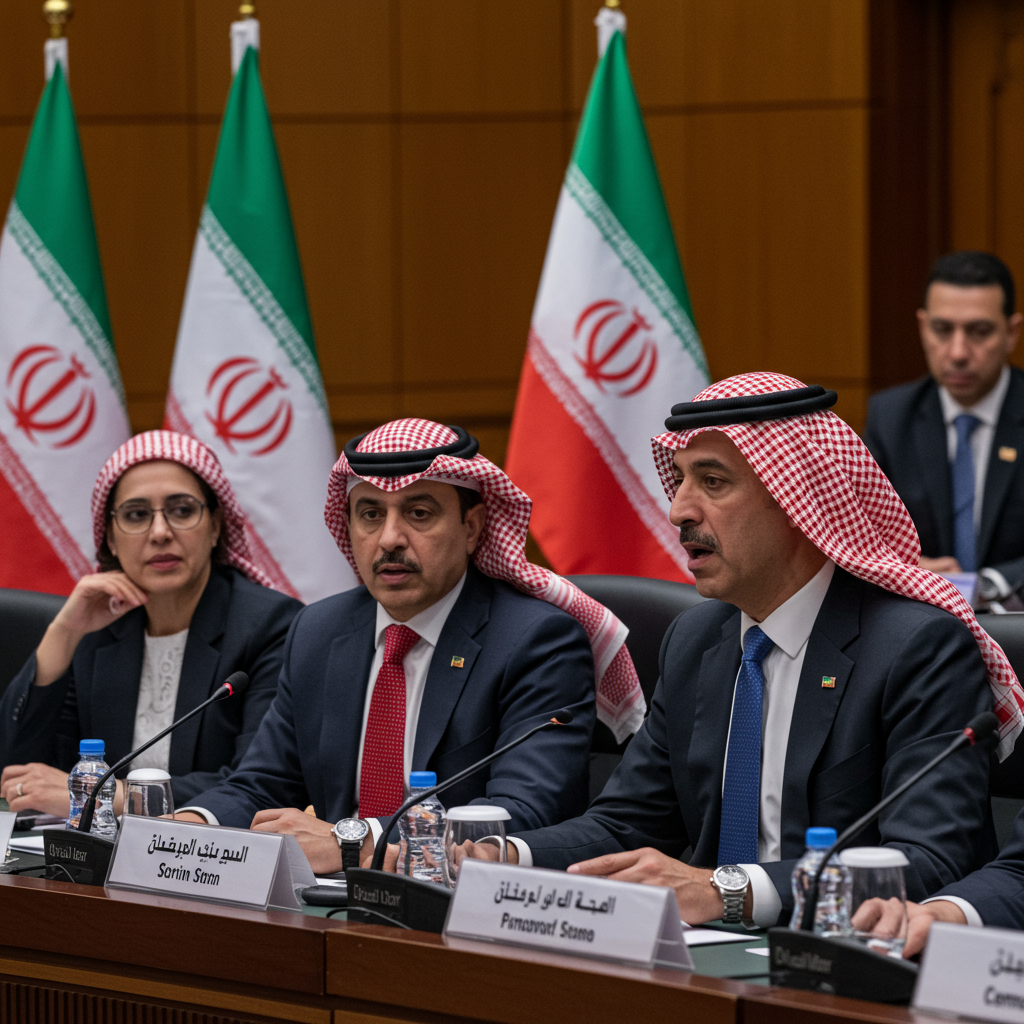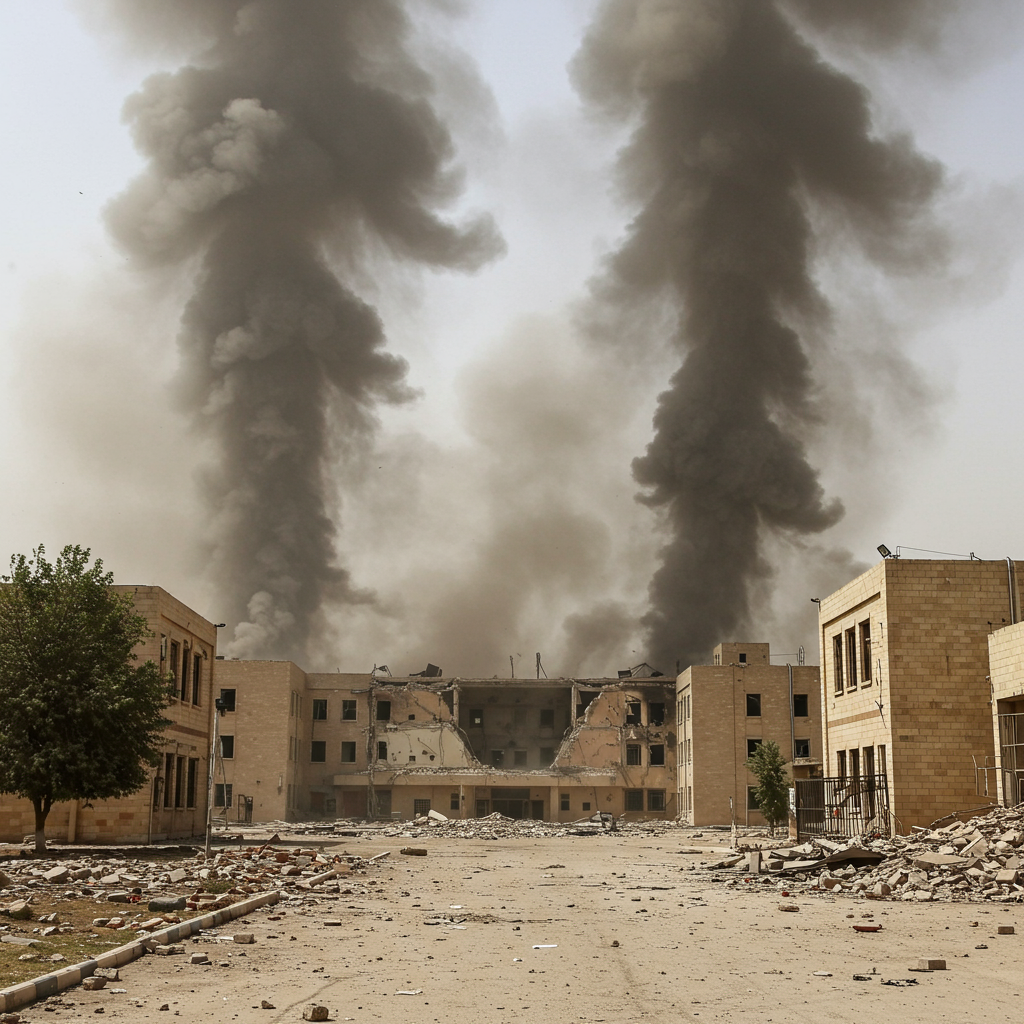Beyond the Bluster: Decoding Middle East Reactions to Israeli Strikes on Iran
When Israel launched recent strikes against Iran, the world watched closely for reactions from Iran’s neighbors and other regional players. On the surface, condemnations were swift, arriving from capitals across the Middle East. However, a deeper look suggests these public pronouncements often serve as diplomatic theater, masking complex geopolitical realities and, crucially, a pervasive fear of a nuclear-armed Iran.
Diplomacy in the region frequently involves carefully staged meetings and statements designed for public consumption, whose true meaning can differ significantly from the actual sentiments of national leaders. Understanding what leaders really feel about both Israel and Iran is key to deciphering these reactions.
The Chorus of Condemnation: A Closer Look
Countries surrounding Iran were quick to issue statements following the Israeli attack. While some were more forceful than others, their underlying motivations reveal a complex picture:
Bahrain: Despite having faced past Iranian attempts to destabilize its monarchy, Bahrain urged Israel to de-escalate.
Azerbaijan: This secular nation, often at odds with Iran’s theocracy and welcoming Iranians escaping the regime, “resolutely” reproached Israel. Yet, it simultaneously signaled its strong alliance with Israel and the United States would remain intact. As Azerbaijan’s foreign ministry spokesperson, Aykhan Hajizada, stated previously regarding Iran’s complaints about their alliances, “We are building relations based on our national-security interests, and not based on the interests of the neighboring country.” A nuclear Iran, from Azerbaijan’s perspective, would severely threaten that independence.
Iraq: With a Shiite-led government influenced by Iran, Iraq’s response was notably weak, vowing little more than sending a letter to the United Nations.
Saudi Arabia: Issued one of the most vigorous denunciations, calling the strikes “blatant aggressions” and “heinous.” However, Saudi Arabia presents perhaps the clearest case of public denunciation contrasting with private calculation.
The Hidden Motives: Fear Trumps Solidarity
This lineup of condemnations resembles a drawing-room mystery where almost every character has a motive against the ‘victim’ (Iran), making the actual act of the ‘murderer’ (Israel) almost secondary to the underlying tensions.
Nearly all countries surrounding Iran possess compelling reasons to prefer a weakened Iran and harbor deep dread regarding the prospect of a nuclear one.
For Saudi Arabia, despite a China-brokered deal in 2023 that restored diplomatic ties, the relationship with Iran remains fundamentally irreconcilable. Crown Prince Mohammad bin Salman previously described Israel not as an enemy but a “potential ally” with shared interests, contrasting this with Iran, a neighbor he “could not get rid of.” Iran poses a direct, existential threat to Saudi Arabia’s vital oil infrastructure through its missile and drone capabilities. Furthermore, Iran has a history of fomenting internal dissent and revolt against the Saudi monarchy, evidenced by the 2017 Iranian-backed uprising in the Shiite-majority Eastern Province, where bullet-pocked walls still serve as reminders of the conflict. Saudi Arabia lacks the independent means to deter this threat, making allies like the U.S. and Israel strategically crucial.
Similarly, Bahrain’s Sunni monarchy rules a majority Shiite population susceptible to Iranian influence and calls for regime change. Azerbaijan, despite its Shiite majority, fiercely guards its secular identity and fears the dominance a nuclear Iran could exert over the region, potentially ending its autonomy.
The Overriding Fear: A Nuclear Iran
While regional states may have grievances with Israel and their populations might welcome seeing the Jewish state humbled, their immediate and overriding concern is the potential for a nuclear Iran. Iran has uniquely cultivated and armed proxy groups across the region (from Lebanon to Yemen to Iraq), using them to project power and destabilize governments. The horrifying prospect of a nuclear Iran operating under an “atomic umbrella” and using this leverage to dictate terms to its neighbors is seen as catastrophic for their national security and independence.
Therefore, despite the public condemnations, many regional leaders likely view actions that degrade Iran’s military capabilities, particularly its nuclear program, as serving their own strategic interests.
Iran’s Perspective: Condemnations Aren’t Enough
Adding another layer of complexity, even Iran itself views these condemnations as insufficient, albeit for different reasons. From Iran’s perspective, Israel is the blatant aggressor, conducting widespread attacks targeting not just military sites but allegedly also residential areas, government buildings, transportation, economic infrastructure like oil refineries, and even nuclear facilities. Iran asserts it is acting in self-defense in response to these strikes, which it claims occurred even while diplomacy was supposedly underway.
Mohammad Boroujerdi, Iran’s Ambassador to Indonesia, explicitly criticized member states of the Organization of Islamic Cooperation (OIC) for relying solely on political condemnation. He argued for concrete, effective measures like boycotting Israeli products and leveraging control over energy and essential supplies to exert genuine pressure and halt what Iran views as aggression. He warned that a passive international stance enables further Israeli expansion and that other Islamic nations could become future targets if Israel is not challenged effectively now.
Even Allies Offer Muted Responses
Interestingly, the muted nature of responses isn’t limited to Iran’s traditional rivals. Even countries often perceived as Iran’s strategic allies, like Russia and China, have drawn criticism from Iranian media for their hesitant and delayed reactions to the Israeli strikes.
Iranian outlets highlighted that while many regional states issued condemnations within hours, Moscow’s initial official response was significantly delayed and limited to expressing “deep concern” and urging restraint, a stance seen as only “slightly different” from European nations. While Russia’s UN Ambassador later adopted a slightly stronger tone, criticizing the raid as violating international law and potentially coordinated with the U.S., he notably avoided using the term “condemn.” China also reportedly took three days to react, issuing a cautious response.
Iranian commentators have questioned the reliability of relying on Moscow and Beijing, pointing to past instances where Russian actions seemed to contradict the idea of a robust strategic partnership (e.g., supporting UAE claims over disputed islands, delays in military deliveries). Experts suggest Russia may prioritize its relations with other Middle Eastern parties (Arab states or Israel) over unequivocally siding with Iran.
Rhetoric vs. Reality
In conclusion, the seemingly straightforward condemnations of Israeli actions by Middle Eastern states are far from simple expressions of solidarity with Iran. They represent a complex tapestry of diplomatic performance, masking deep-seated fears, strategic calculations, and overriding national security interests. While publicly decrying Israeli aggression, many regional powers are primarily concerned with the destabilizing potential of a nuclear Iran and quietly welcome anything that might contain or weaken it. From Iran’s perspective, however, these condemnations are too little, too late, lacking the concrete action needed to genuinely deter further attacks. The reactions reveal that in the high-stakes geopolitical theater of the Middle East, rhetoric often serves to conceal a reality driven by fear and self-preservation.
References
- www.theatlantic.com
- en.tempo.co
- www.algemeiner.com
- www.iranintl.com
- <a href="https://www.huffingtonpost.co.uk/entry/downing-street-condemns-kneecaps-half-hearted-apology-over-kill-mps-remarksuk6810b5fae4b0c99c9f2466d8″>www.huffingtonpost.co.uk



